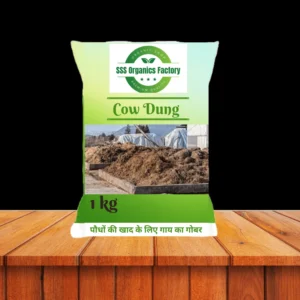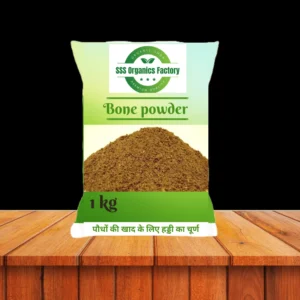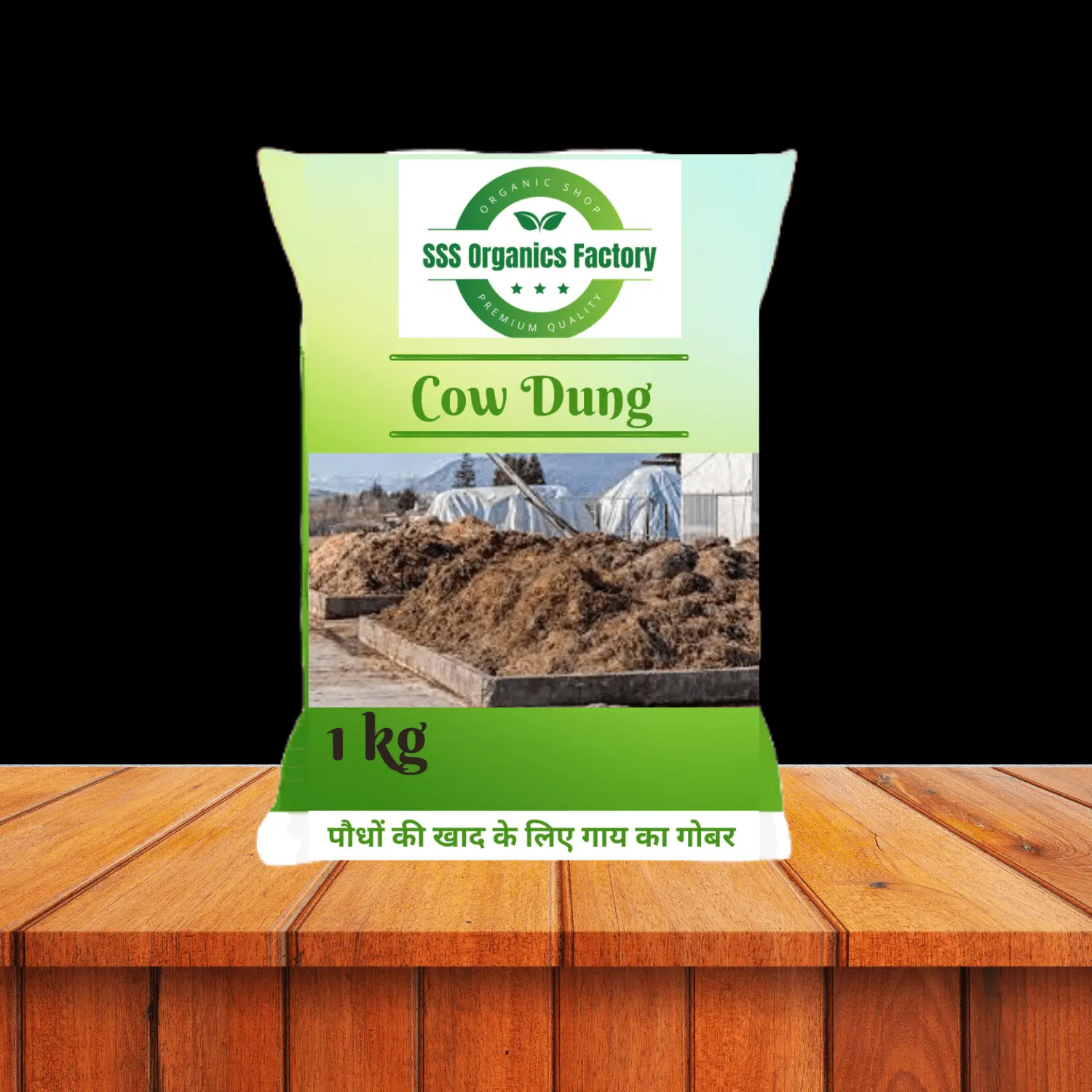No products in the cart.
Organic Cow Dung Compost Transform
₹59.99
Discover the power of organic cow dung compost! Enrich soil, boost plant health, and embrace sustainability with nutrient-rich compost. Start your garden transformation today.
Dose:-
- 10 kg. / 1 sq. meter (10 sq. ft area) for soil preparation.
- 5 kg. / 1 sq. meter (10 sq. ft area) for existing garden area (Twice in year).
- 300 gm. to 1 kg. Per pot (Twice in year).
Method of application:-
- Add 50 mm to 100 mm Super Grow on soil surface.
- Spade to a depth of 15 cm to 30 cm, mixing well in soil.
- Level the garden with a rake.
Description
Organic Cow Dung Compost
Embrace Nature with Organic Cow Dung Compost
Harnessing the Power of Nature
Discover the transformative potential of organic cow dung compost for your garden. Our compost is meticulously crafted from natural cow dung, ensuring optimal nutrients for your plants. This eco-friendly solution enriches your soil, promoting healthier growth and vibrant blooms. Embrace sustainability and watch your garden flourish.

Why Choose Cow Dung Compost?
- Rich in Nutrients: Enhance soil fertility with a powerhouse of organic nutrients.
- Sustainable Gardening: Reduce waste and support eco-friendly practices.
- Improved Soil Structure: Boost water retention and aeration for healthier roots.
- Organic Pest Control: Naturally deter pests and weeds, promoting plant health.
- Ethical Farming: Support responsible agriculture and sustainable farming methods.
Transform Your Garden Naturally
Bring life to your landscape with our organic cow dung compost. Experience the difference of nutrient-rich soil that nurtures plants from root to bloom. Elevate your gardening game with an eco-conscious choice that celebrates nature’s gifts.
The Benefits of Cow Dung Compost for Organic Farming
In the realm of organic farming, cow dung compost holds immense value and benefits that contribute to soil health, plant growth, and sustainability practices. Discover how utilizing cow dung compost can revolutionize your farming methods.
Enhancing Soil Fertility with Cow Dung Compost
Cow dung compost is a powerful natural fertilizer, rich in essential nutrients like nitrogen, phosphorus, and potassium. When applied to the soil, it enriches the land by improving its fertility and structure. This nutrient-dense compost promotes healthier root systems and enhances the soil’s ability to retain moisture, vital for sustained plant growth.
Weed Suppression and Pest Control
An underrated benefit of cow dung compost is its ability to suppress weeds and control pests naturally. The compost creates a natural barrier against weed growth, reducing the need for chemical herbicides. Moreover, the beneficial microbes present in cow dung compost deter harmful pests, promoting a balanced ecosystem within your farm.
Sustainable and Cost-Effective Farming Solution
Incorporating Organic soil enrichment compost into your farming practices is not only environmentally friendly but also cost-effective. By recycling Organic soil enrichment into compost, farmers can reduce waste while producing a valuable resource for their crops. This sustainable approach minimizes the need for synthetic fertilizers and contributes to long-term soil health.
Reducing Environmental Impact
Choosing Organic soil enrichment compost over chemical fertilizers reduces the environmental impact of farming. Chemical fertilizers can pollute water sources and disrupt ecosystems. Conversely, Organic soil enrichment compost is a renewable resource that supports the natural balance of soil nutrients, benefiting both the farm and surrounding environment.
Improved Crop Yields and Plant Health
One of the most significant advantages of using Organic soil enrichment compost is its positive impact on crop yields and overall plant health. The organic matter in the compost enriches the soil, providing a steady release of nutrients that plants can readily absorb. This results in healthier, more robust crops with increased resistance to diseases and adverse weather conditions.
Steps to Implement Organic soil enrichment Compost in Farming
Implementing Organic soil enrichment compost in your farming regimen requires careful planning and execution:
- Collection and Decomposition: Gather Organic soil enrichment from healthy, organically raised cattle. Allow the dung to decompose naturally, preferably in a compost pit or heap.
- Composting Process: Mix the decomposed Organic soil enrichment with organic materials like crop residues, kitchen waste, or leaves to accelerate the composting process.
- Application: Apply the matured compost to the soil during the growing season. Ensure even distribution across the farm for maximum benefit.
Organic Soil Enrichment: Enhancing Soil Health Naturally
Organic soil enrichment is a vital practice in sustainable agriculture, focused on improving soil health using natural and environmentally friendly methods. Let’s delve into the importance and benefits of organic soil enrichment techniques for promoting robust plant growth and fostering a healthy ecosystem.
Importance of Organic Soil Enrichment
Healthy soil is the cornerstone of successful agriculture. Organic soil enrichment techniques prioritize the use of natural materials like compost, manure, and cover crops to nourish the soil. This approach avoids synthetic chemicals and promotes biodiversity, ensuring long-term soil fertility and productivity.
Benefits of Organic Soil Enrichment
- Improved Soil Structure: Organic amendments such as compost help improve soil structure by increasing its ability to hold water and nutrients. This creates a favorable environment for beneficial soil organisms and root development.
- Nutrient-Rich Soil: Organic soil enrichment adds essential nutrients to the soil, including nitrogen, phosphorus, and potassium. These nutrients are released slowly over time, providing a steady supply to plants and reducing nutrient runoff.
- Enhanced Water Retention: Organic matter in the soil acts like a sponge, improving water retention and reducing the risk of erosion. This is crucial, especially in regions prone to drought.
- Promotion of Soil Microorganisms: Organic practices support a diverse community of soil microorganisms, such as bacteria, fungi, and earthworms.
- Reduction of Environmental Impact: Unlike chemical fertilizers, organic soil enrichment methods minimize the risk of water pollution and soil degradation. They also contribute to carbon sequestration, mitigating climate change effects.
Effective Organic Soil Enrichment Techniques
- Composting: Recycling organic waste into compost enriches the soil with valuable nutrients and organic matter. Compost can be made from kitchen scraps, yard trimmings, and livestock manure.
- Cover Cropping: Planting cover crops like legumes and grasses during fallow periods improves soil structure, fixes nitrogen, and suppresses weeds.
- Crop Rotation: Rotating crops helps prevent soil nutrient depletion and reduces pest and disease pressure, promoting overall soil health.
- Mulching: Applying organic mulches like straw, leaves, or wood chips conserves soil moisture, regulates soil temperature, and suppresses weed growth.
Implementing Organic Soil Enrichment
To incorporate organic soil enrichment into your gardening or farming practices:
- Test your soil to determine nutrient deficiencies and pH levels.
- Choose appropriate organic amendments based on soil test results and crop requirements.
- Apply organic matter regularly, either by incorporating compost into the soil or using mulch on the surface.
- Practice crop rotation and cover cropping to diversify soil nutrients and break pest cycles.
Sustainable Gardening Solutions: Enhancing Your Garden and Environment
Sustainable gardening is more than just a trend—it’s a responsible approach to cultivating gardens that thrive while minimizing environmental impact. Let’s explore effective sustainable gardening solutions that promote biodiversity, conserve resources, and support healthy ecosystems.
Importance of Sustainable Gardening
Sustainable gardening practices play a crucial role in conserving natural resources and reducing the carbon footprint associated with traditional gardening methods. By adopting sustainable approaches, gardeners can contribute positively to environmental conservation and create resilient, beautiful landscapes.
Key Sustainable Gardening Solutions
1. Water Conservation
Conserving water is a fundamental aspect of sustainable gardening, especially in regions prone to drought. Implement these practices to reduce water usage:
- Mulching: Apply organic mulches like straw, wood chips, or compost to retain soil moisture and suppress weed growth.
- Rainwater Harvesting: Install rain barrels or cisterns to collect rainwater for watering plants, reducing reliance on municipal water sources.
- Drip Irrigation: Use drip irrigation systems to deliver water directly to plant roots, minimizing water loss through evaporation.
2. Soil Health Management
- Composting: Turn kitchen scraps, yard waste, and plant trimmings into nutrient-rich compost to improve soil fertility and structure.
- Cover Cropping: Plant cover crops like clover or vetch to add organic matter, fix nitrogen, and prevent erosion during fallow periods.
- No-Till Gardening: Avoid tilling to preserve soil structure and minimize disturbance to beneficial soil organisms.
3. Native Plants and Biodiversity
Incorporating native plants into your garden benefits local wildlife and reduces the need for excessive maintenance:
- Native Plant Selection: Choose plants indigenous to your region, as they are adapted to local conditions and require less water and care.
- Wildlife Habitats: Create habitats like birdhouses, bee hotels, or butterfly gardens to attract beneficial insects and pollinators.
4. Organic Pest and Weed Management
Minimize chemical inputs by using natural methods to manage pests and weeds:
- Integrated Pest Management (IPM): Monitor pest populations and use biological controls like beneficial insects or organic sprays as needed.
- Weed Suppression: Use mulches, hand-weeding, or flame weeding to control weeds without synthetic herbicides.
Implementing Sustainable Gardening Practices
To transition to sustainable gardening, follow these actionable steps:
- Assess Your Garden: Evaluate existing practices and identify areas for improvement, such as water usage, soil health, or plant selection.
- Plan for Sustainability: Create a garden plan that incorporates sustainable techniques tailored to your specific climate and landscape.
- Start Composting: Begin composting kitchen scraps and yard waste to enrich your soil naturally.
- Choose Native Plants: Replace non-native plants with native species that thrive in your area and support local wildlife.
Natural Plant Nutrients: Enhancing Growth and Health
Plants require essential nutrients to thrive and achieve optimal growth. While synthetic fertilizers are commonly used, natural plant nutrients offer a sustainable and eco-friendly alternative. Let’s explore the importance of natural plant nutrients and how they contribute to healthier plants and soils.
Importance of Natural Plant Nutrients
Natural plant nutrients are derived from organic sources such as compost, manure, and organic matter. These nutrients are essential for plant growth, root development, flowering, and fruit production. Unlike synthetic fertilizers, which can have negative environmental impacts, natural plant nutrients promote soil health and microbial activity, leading to sustainable gardening and farming practices.
Common Natural Plant Nutrients
1. Nitrogen (N)
Nitrogen is vital for leafy growth and overall plant vigor. Natural sources of nitrogen include:
- Compost: Rich in organic matter and nitrogen, compost slowly releases nutrients as it decomposes.
- Manure: Animal manure, such as from cows or chickens, is a valuable source of nitrogen and other nutrients.
2. Phosphorus (P)
Phosphorus supports root development, flowering, and seed production. Natural sources of phosphorus include:
- Bone Meal: Ground bones provide phosphorus in a form that is readily available to plants.
- Rock Phosphate: A slow-release source of phosphorus derived from natural rock deposits.
3. Potassium (K)
Potassium enhances overall plant health and strengthens resistance to diseases and stress. Natural sources of potassium include:
- Wood Ash: Contains potassium and other minerals beneficial to plants.
- Kelp Meal: Derived from seaweed, kelp meal is rich in potassium and micronutrients.
4. Calcium, Magnesium, and Micronutrients
Natural sources of calcium and magnesium include limestone and dolomite. Micronutrients such as iron, zinc, and manganese can be sourced from compost and organic amendments.
Benefits of Using Natural Plant Nutrients
- Improves Soil Structure: Natural plant nutrients contribute to soil health by enhancing soil structure, water retention, and nutrient availability.
- Supports Beneficial Microbes: Organic amendments promote the growth of beneficial soil microbes, which aid in nutrient cycling and disease suppression.
- Reduces Environmental Impact: Unlike synthetic fertilizers, natural plant nutrients minimize nutrient runoff and groundwater pollution, supporting a healthier ecosystem.
Implementing Natural Plant Nutrients
To incorporate natural plant nutrients into your gardening or farming practices:
- Start Composting: Begin composting kitchen scraps, yard waste, and livestock manure to create nutrient-rich compost for your plants.
- Use Organic Amendments: Apply natural amendments like bone meal, kelp meal, or wood ash to provide specific nutrients lacking in your soil.
- Rotate Crops: Practice crop rotation to naturally replenish soil nutrients and prevent nutrient depletion.
Eco-Friendly Composting Methods: Sustainable Ways to Reduce Waste
Embracing eco-friendly composting methods not only diverts waste from landfills but also enriches soil health and supports sustainable gardening practices. Let’s explore effective and environmentally conscious composting techniques that you can implement at home or in your community.
Importance of Eco-Friendly Composting
Eco-friendly composting is a critical component of reducing waste and promoting sustainable living. By composting organic materials such as food scraps, yard trimmings, and paper waste, you can minimize methane emissions from landfills and create valuable compost for enriching soils without relying on synthetic fertilizers.
Effective Eco-Friendly Composting Methods
1. Backyard Composting
Backyard composting is accessible to most homeowners and requires minimal space and resources.
Choose a Location: Select a suitable spot in your yard for a compost pile or bin, preferably in a shaded area with good drainage.
- Layering Materials: Alternate layers of green (nitrogen-rich) and brown (carbon-rich) materials, such as kitchen scraps, leaves, grass clippings, and shredded paper.
- Turning the Pile: Regularly turn or aerate the compost pile to accelerate decomposition and prevent odors.
2. Vermicomposting (Worm Composting)
Worms are used in vermicomposting to convert organic waste into castings that are rich in nutrients.. Here’s how to set up a vermicomposting system:
- Obtain Worms: Purchase red wigglers or composting worms suitable for vermicomposting.
- Prepare a Bin: Use a shallow container with bedding material (shredded newspaper or coconut coir) and add worms and organic waste.
- Maintain Moisture and Temperature: Keep the bedding moist and avoid extremes in temperature to ensure optimal worm activity.
3. Community or Large-Scale Composting
Community composting involves collective efforts to compost organic waste on a larger scale. Consider these steps for community composting initiatives:
- Engage Local Residents: Educate and involve community members in composting activities through workshops or shared composting facilities.
- Establish Collection Points: Set up designated locations for dropping off food scraps and yard waste.
- Monitor and Maintain Compost Piles: Regularly turn and manage compost piles to ensure proper decomposition and odor control.
4. Bokashi Composting
Bokashi composting utilizes anaerobic fermentation to break down organic matter quickly. Here’s how to implement Bokashi composting:
- Use Bokashi Bran: Apply Bokashi bran to food waste in an airtight container, layering waste and bran until the container is full.
- Fermentation Period: Allow the mixture to ferment for a few weeks, then bury it in soil or add it to a traditional compost pile to complete the decomposition process.
Benefits of Eco-Friendly Composting
- Decreases Waste: By keeping organic waste out of landfills, composting helps to cut down on greenhouse gas emissions and preserves landfill space.
- Enriches Soil Health: Compost improves soil structure, fertility, and water retention, promoting healthier plants and reducing the need for chemical fertilizers.
- Promotes Sustainable Practices: Eco-friendly composting aligns with sustainable living principles, fostering environmental stewardship and community engagement.
Conclusion
Eco-friendly composting methods offer practical solutions to reduce waste and promote sustainable gardening and farming practices. Whether you compost at home, participate in community initiatives, or experiment with innovative techniques like vermicomposting or Bokashi composting, you contribute to a healthier planet and more resilient ecosystems. Embrace eco-friendly composting methods to close the loop on organic waste and nurture thriving soils for future generations.
Go and turn on towards organic farming to save future and thire save childs:
Elevate Plant Growth with Premium Bone Powder – Buy Now!
Organic Cow Dung Compost: Transform Your Garden Naturally
Premium Humic Acid for Healthy Plants | Enhance Soil & Boost Growth
Boost Plant Growth Naturally with Mustard Cake | Organic Fertilizer
Transform Your Garden with NPK Fertilizer | Boost Growth by 30%
Premium Perlite for Enhanced Gardening | Buy Now
Live Earthworms with Enhance Your Garden (soil health)
1 Neem Khali: Unveiling the Wonders of Nature
1Transform your garden with vermiwash-buy now
1 Premium quality Vermicompost [ केचुआ खाद ]
Must visit:
सत्ता की साझेदारी से आप क्या समझते हैं
Vegetable Farming A Guide to Successful Cultivation
Discover Mustard Crop: Cultivation, Uses, and Health Benefits
Exploring the Evolution and Impact of Modern Agriculture
Essential Guide to Agriculture Sprayers
Follow us:
Youtube
Instagram
Facebook
Sale

Elevate Plant Growth with Premium Bone Powder – Buy Now!
Rated 0 out of 5
Bone Powder
Transform your garden with nutrient-rich bone powder . Strengthen roots and boost foliage with our organic plant growth enhancer. Shop now for lush, vibrant plants!
Original price was: ₹150.00.₹99.99Current price is: ₹99.99.
Total Sold: 1

Organic Cow Dung Compost: Transform Your Garden Naturally
Rated 0 out of 5
Cow Dung
Discover the power of organic cow dung compost! Enrich soil, boost plant health, and embrace sustainability with nutrient-rich compost. Start your garden transformation today.
₹59.99
Total Sold: 0
Sale

Premium Humic Acid for Healthy Plants | Enhance Soil & Boost Growth
Rated 0 out of 5
Humic acid
Transform your garden with our premium humic acid. Enrich soil fertility, boost plant resilience, and embrace eco-friendly gardening for vibrant, healthy plants. Order now for lush gardens!
Original price was: ₹399.00.₹99.00Current price is: ₹99.00.
Total Sold: 0

Boost Plant Growth Naturally with Mustard Cake | Organic Fertilizer
Rated 0 out of 5
Mustard cake
Discover the benefits of mustard cake for plants. Enhance soil fertility and promote lush growth organically. Explore eco-friendly gardening solutions today!


